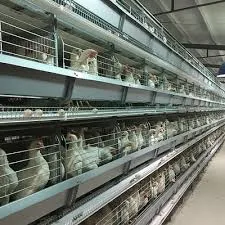Innovative Designs for Modern Poultry Housing Solutions and Sustainable Farming Practices
Oct . 21, 2024 10:08 Back to list
Innovative Designs for Modern Poultry Housing Solutions and Sustainable Farming Practices
Modern Poultry Houses Revolutionizing Poultry Farming
The poultry industry is undergoing a significant transformation driven by the adoption of innovative technologies and modern management practices. At the heart of this revolution are modern poultry houses, which are designed to enhance the efficiency, welfare, and productivity of poultry farming. These structures not only cater to the needs of the birds but also meet the expectations of consumers for sustainable and ethical food production.
A modern poultry house is engineered with advanced designs that prioritize the well-being of the birds
. One of the key features is climate control technology, which maintains optimal temperature, humidity, and ventilation levels. These conditions are essential for the health and productivity of poultry, as they help reduce stress and the risk of disease. By utilizing automated ventilation systems and climate monitoring devices, farmers can ensure that their flocks thrive throughout the year, regardless of external weather conditions.Furthermore, modern poultry houses incorporate innovative feeding and watering systems. These systems are designed for efficiency, minimizing waste while maximizing the nutritional intake of the birds. Automatic feeders and drinkers help maintain consistent access to food and water, essential for the growth and well-being of poultry. This results in healthier birds, improved feed conversion rates, and ultimately, more sustainable production practices.
Biosecurity is another critical aspect of modern poultry housing. With increasing concerns about avian diseases and outbreaks, poultry farms must implement stringent biosecurity measures. Modern poultry houses are built with biosecurity in mind, incorporating features such as controlled entry points, footbaths, and separate facilities for sick birds. This reduces the risk of pathogen introduction and spread, protecting both the flock and the broader agricultural community.
modern poultry house

Additionally, the integration of technology such as IoT (Internet of Things) devices has taken poultry farming to the next level. These devices enable real-time monitoring of various parameters within the poultry house, allowing farmers to make informed decisions regarding flock management. From monitoring feed and water consumption to tracking temperature and humidity levels, IoT technology offers valuable insights that can lead to improved productivity and efficiency.
Another essential consideration in modern poultry housing is the welfare of the birds. Consumers are increasingly concerned about how farm animals are treated, and the poultry industry is responding by adopting practices that prioritize animal welfare. Modern poultry houses often provide more space per bird, access to natural light, and enriched living conditions that allow chickens to engage in natural behaviors. These improvements not only benefit the animals but also enhance the quality of the products, aligning with consumer demands for ethically raised poultry.
Sustainability is also a driving force behind the design of modern poultry houses. Farmers are adopting practices that reduce their environmental impact, such as efficient waste management systems that recycle manure as fertilizer and renewable energy sources like solar panels. These practices contribute to a more sustainable food system and appeal to environmentally conscious consumers.
In conclusion, modern poultry houses represent a significant advancement in the poultry industry, addressing critical challenges related to efficiency, animal welfare, and sustainability. By integrating innovative technologies, prioritizing biosecurity, and enhancing living conditions for the birds, these facilities are not only improving productivity but also aligning with consumer expectations for responsible food production. As the demand for poultry continues to grow, modern poultry houses will be essential in meeting this demand while ensuring the health of the birds and the environment. The future of poultry farming is bright, as these innovations pave the way for a more sustainable and ethical industry.
-
Automatic Feeding Line System-Pan Feeder Nipple Drinker|Anping County Yize Metal Products Co., Ltd.
NewsJul.29,2025
-
Hot Sale 24 & 18 Door Rabbit Cages - Premium Breeding Solutions
NewsJul.25,2025
-
Automatic Feeding Line System Pan Feeder Nipple Drinker - Anping County Yize Metal Products Co., Ltd.
NewsJul.21,2025
-
Automatic Feeding Line System Pan Feeder Nipple Drinker - Anping County Yize Metal Products Co., Ltd.
NewsJul.21,2025
-
Automatic Feeding Line System - Anping Yize | Precision & Nipple
NewsJul.21,2025
-
Automatic Feeding Line System - Anping Yize | Precision & Nipple
NewsJul.21,2025






